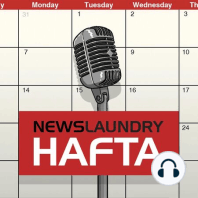3 min listen

Reporters Without Orders Ep 13: I&B ministry, Dalit protests, media’s demographic bias & more
FromNL Hafta
Reporters Without Orders Ep 13: I&B ministry, Dalit protests, media’s demographic bias & more
FromNL Hafta
ratings:
Length:
1,047 minutes
Released:
Apr 3, 2018
Format:
Podcast episode
Description
In this episode of Reporters Without Borders, the team engages in a conversation about the I&B ministry's order to regulate fake news as well as media reportage on the nationwide Dalit protest.While discussing Uttar Pradesh government's decision to officially include 'Ramji' in documents mentioning BR Ambedkar, Rohin points out the importance of adding historical context to debates. "Ambedkar's critique on Ram and casteism would actually scare the Hindutva forces," he tells the panel.Amit talks about media’s demographic bias, and how newsrooms highlight issues from certain states only. "Jharkand's government has drafted an amendment saving officers accused in the forgery of land sale and conversions...had there been a similar draft in Uttar Pradesh, it would have been covered by national media," he states.Discussions on Dalit agitation has Abhinandan questioning media's sympathetic coverage of the protesters, despite compelling evidence of violence. "Dalit protests are usually not covered by TV channels or newspapers. It was the narrative of this protest that led to such mass coverage," says Amit.Rohin points out how the protests have deepened class differences and talks about Savarna reporters looking at the protest with a biased lens.Cherry shares why I&B ministry’s amendment to journalists’ accreditation guidelines was problematic. The amendment threatens to take away a journalist's accreditation even before the journalist’s guilt is established, she says. She also speaks about the responsibility of verification being given to self-regulatory bodies. “The PCA and NBA have proved to be ineffective in the past...are we really expecting them to look into these cases in fifteen days and tell whether they are fake news or not ?" she asks. She also points out that the guidelines do little to curb the menace created by social media websites, which have widely contributed to the spread of fake news.Abhinandan tells us why Mayawati becoming a chief minister at her time was a bigger deal than Barack Obama, an African-American, becoming the President of the United States. See acast.com/privacy for privacy and opt-out information.
Released:
Apr 3, 2018
Format:
Podcast episode
Titles in the series (100)
Bill Maher on what the word Catholic means and Adam and Eve’s sin. by NL Hafta